You may have occasionally noticed that your dog licks his paws when he’s lounging around or after he’s come from outdoors. It’s entirely natural for him to groom his paws, but if you become aware that it has become aggressive or constant, you need to find out what is causing the behavior.
Why does my dog lick his paws, and what can I do about it? Dogs may lick their paws as a means of grooming themself and ridding their paws of dirt, food, and other residues. If you find that your dog licks his paws constantly, a trip to the vet may be needed as it could be due to a health problem or foreign object being stuck.
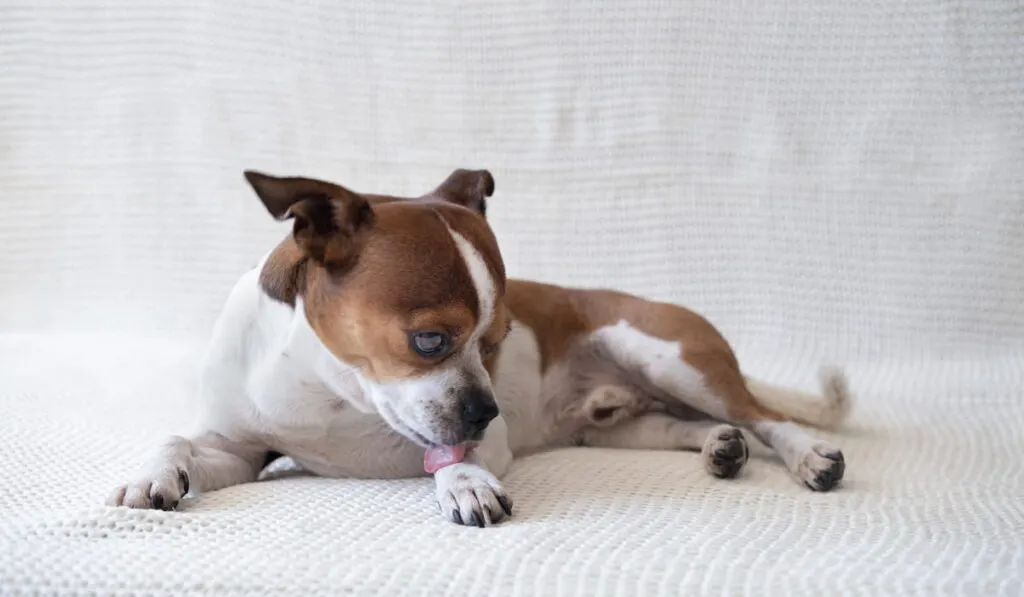
It’s completely normal for your dog to lick his paws from time to time. It’s a primal instinct for both cats and dogs to groom themselves after eating or random times throughout the day. Understanding the differences between natural grooming and an underlying issue is vital.
Table of Contents
Natural Reasons Why Your Dog Is Licking His Paws
The most common reason for your dog licking his paws is because he is grooming himself. Grooming behaviors are entirely healthy, especially if your dog has been outdoors recently.
When they come inside from a play session or a walk, their grooming may even escalate from licking to gnawing lightly. Typically, this is because your dog has some dirt, mud, or other debris lodged in his paw, and he wants to get it out. This behavior is nothing to worry about if they are not causing any damage to their paws.
It’s a bit alarming the first time you see your pup go after their paws. But remember, this is simply their way of cleaning themselves.
Pay attention to your dog’s paws after you come in from a walk or playtime. If you live in an area with ticks, it’s always wise to check their paws and fur when you come inside. But also pay attention to their nails, pads on their feet, and overall health of their paws.
If their paws look healthy but dirty, they will probably be busy for the next 5-10 minutes doing their thing and licking away all the dirt, and there is nothing to worry about.
When to Call Your Vet
As dog moms and dads, we always want to make sure we are proactive in the health of our pups. If paw licking goes from an occasional grooming habit to an aggressive act that appears to be harmful or constant, then it may be time to contact your vet.
The reasons your dog is either being too harsh with their grooming or doing it too often can be an underlying health or behavioral issue.
Whatever the case, you should first seek the advice and care of a licensed veterinarian before trying to take matters into your own hands. Doing so will bring relief to your dog and prevent any injuries you could cause to his paws in attempting to solve the issue on your own.
Health Related Reasons Your Dog May Lick His Paws
Several health issues could be the root of the underlying cause for your dog licking his paws too much. Health-related problems that could be causing excessive licking range from mild to severe and should be taken seriously at any degree.
If you believe your dog is experiencing any pain or discomfort from this licking, reach out to your vet right away.
Here are a few health issues that may be at the root of it.
1. Allergic Reactions
Believe it or not, the food your dog eats could be the cause of his paw discomfort. If you find that your dog often licks his paws profusely, try changing the foods that you are feeding him.
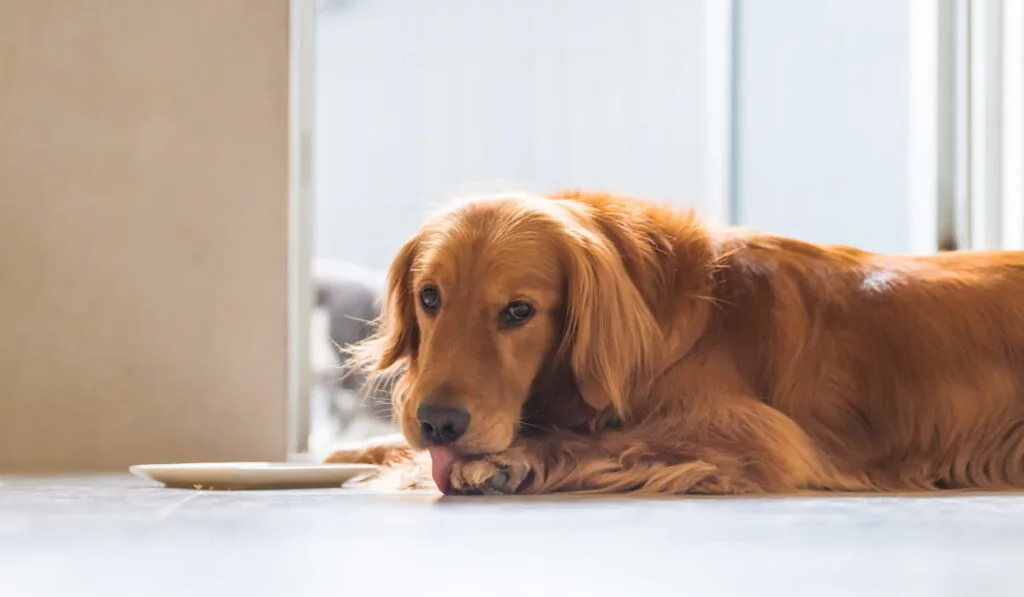
Certain foods may contain allergens that bother your dog’s skin or nails. These allergies will lead to excessive grooming, as it may feel soothing to their itchy or sore skin. But it will not fix the problem, so you must intervene at this point.
If this ends up being the cause, your vet will be able to recommend different brands/ingredients to try instead.
Foods that contain yeast and other heat-processed ingredients can cause your dog to have itchy paws. Your dog’s diet should consist primarily of meat, with small amounts of plants such as carrots, potatoes, or peas.
According to PetMD, allergies from dog foods typically come from the proteins, whether they are animal or plant-based.
Those proteins get broken down into molecules that become identified as a threat to the immune system. This will trigger the allergic reaction that may appear in different forms.
These perceived threats can also develop over time. It doesn’t necessarily mean that you just switched to a new dog food that caused it. Allergies develop and change, so it could also be an environmental allergy.
Non-food allergies could also be the cause of itchy paws from some aspects in the environment. Here are some common allergens that trigger dogs:
- Air born allergens
- Seasonal allergies
- Ingredients in cleaning supplies for around the home
- Ingredients in shampoos or conditioners being used on the dog
- The material of the brush you use
- Laundry detergent used on favorite blankets or sheets they lie on
Sometimes uncovering the allergen can feel like a task for a detective, but finding that underlying cause is essential, so don’t give up. Talk with your vet and make sure you find the reason.
2. There’s A Foreign Object Lodged in The Paw
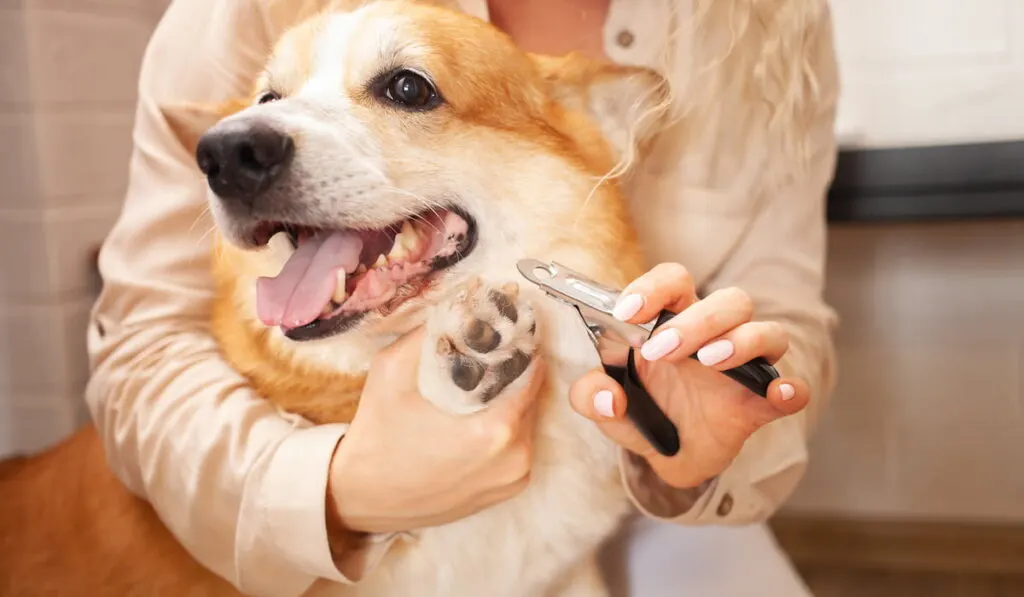
If your dog’s excessive paw licking is due to a foreign object, it’s crucial to seek medical attention right away to prevent further injury or an infection. Sometimes pebbles, splinters, and grass can become lodged in your dog’s paws. If your dog is only licking one of his paws, this is most likely the cause.
First, inspect the paws. Look in between the pads and nails. Move the fur around so you can see if there is anything stuck. You will typically see some sort of redness or irritation around the area where something is lodged, so keep an eye out for that.
Your dog may not be able to speak in words, but their body language, sounds, and faces can tell us everything we need to know. If they are in pain, they will express it to you.
If you notice blood or extreme discomfort, call your vet for guidance.
But if you can locate the object and remove it safely, go ahead and do so.
3. A Paw Injury, Abnormal Growth, Or Dry Skin
Your dog’s constant licking of one paw could also be caused by an injury, abnormal growth or dry skin. All cases should be taken care of by your dog’s veterinarian as an injury or growth could be indicative of a serious underlying medical condition.
Always take a more in-depth look and examine your dog’s paw if you find him bothering one paw over the other. Look for any open wounds or signs of injury that could be an issue. Abnormal growths, such as tumors and cysts, can also cause pain and discomfort.
If you do not see any visible signs of injury or growths of your dog’s paws, the problem could be caused by something not visible to the naked eye.
4. Ticks Or Fleas
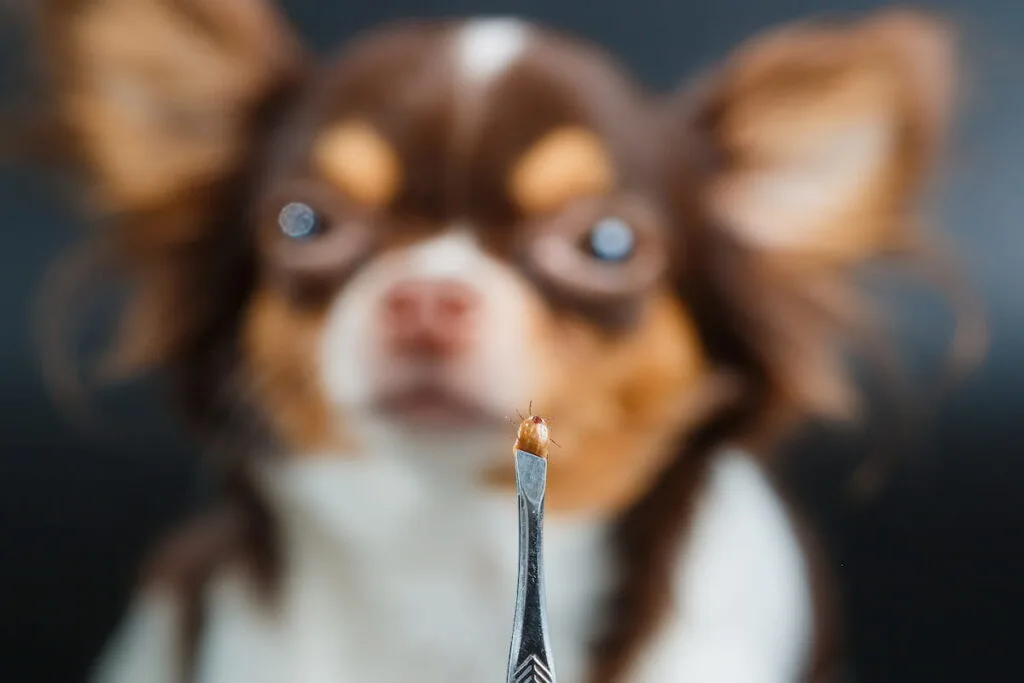
Dogs that spend much time outdoors and in wooded areas are at risk for contracting flea and tick bites. This can cause much irritation and even an allergic reaction in some dogs. If you notice that your dog only focuses on one area of his paw, check that area for any fleas or ticks.
Parasitic infections could also be the cause of excessive licking. Your dog cannot scratch at his paws and so licking may be his only means of providing comfort for himself. Licking at the area can make it worse and lead to infection, so it’s essential to put a stop to the issue as soon as possible.
5. Hormonal Imbalanced
Yes, dogs can become hormonally imbalanced. These imbalances can cause everything from hair loss to irritated skin to emotional distress.
According to All Things Dogs, hormonal issues are a quite common reason for licking. Dogs lick their paws to help reduce stress. So, when hormonal problems occur, licking can become very calming for them.
Hair loss is a common symptom of hormonal imbalances. You may notice more shedding than usual, along with exposed patches of skin that appear irritated.
That irritation is enough to cause excessive licking. If your dog is continuously licking his paws and you see irregularities in their fur and skin, your vet should be able to tell you if the issue is hormone related.
Behavioral Problems That Can Cause Paw Licking
In addition to health-related causes for your dog licking his paws, behavioral habits can be to blame as well. These can either be preexisting behavioral habits or newly formed. The cause of behavioral habits can be both biological and/or environmental.
6. Your Dog Is Anxious
An anxious pup also tends to be a restless pup. Your dog excessively licking his paws could be a way for them to release some of this anxiety.
When left alone or in an unfamiliar environment, your dog may lick his paws as a coping mechanism. The cause of your dog’s anxiety could also be due to reasons such as depression, illness, or old age.
Making sure your dog stays healthy also includes their mental health. Some breeds tend to be more anxious than others, but all dogs are prone to it the same way that humans are. Caring for their mental health is just as important as their physical health.
This anxiety release may feel like a good idea to your pup, but it’s your job to find more productive and safer ways for them to settle any stress.
7. Boredom
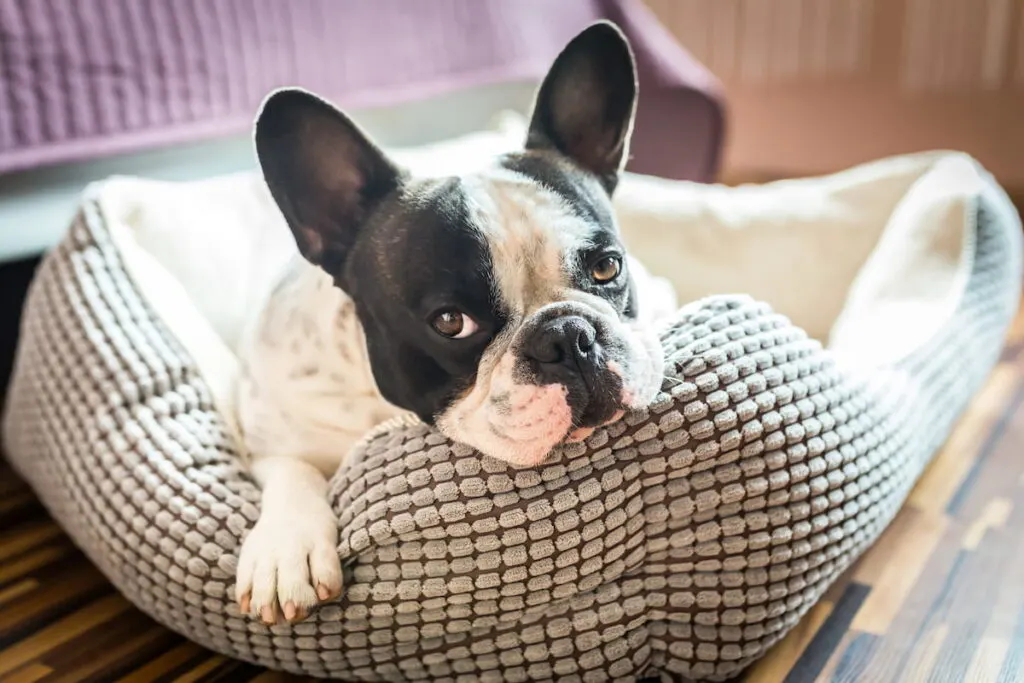
Believe it or not, the animal that chases his tail and finds it to be the most entertaining thing they’ve ever done – can still get bored.
Your dog licking his paws may simply be out of boredom. It is a soothing act that gives them something to do. While they may not be as tasty as a bone or as good for their teeth, they still find some sort of entertainment and relaxation value from the act of licking and chewing their paws.
This is fine if they don’t go overboard. But what dog wants to be bored?
If you think they are licking out of boredom, try to immediately engage them in playtime. Teach them that they should play with toys rather than lick their paws for hours on end.
Keep interactive toys around the house that your dog can access even if you are busy. And always make sure you give them lots of love and attention with walks, playtime, and cuddles every day.
8. Your Dog Has Formed An Obsessive Habit
Your dog licking his paws out of anxiousness or stress could result in it becoming an obsessive-compulsive tendency.
If this is the case, your dog can no longer sustain from licking his paws for long periods and may require the help of a professional or a change of lifestyle.
Redness or swelling of your dog’s paws is an obvious indication of irritation or infection. Your dog may not realize he is doing more harm than good by licking his paws to feel better, and therefore you must intervene should you notice the compulsive habit. Licking can cause your dog’s paws to become raw as a result of irritation.
Just like humans, dogs may do things that aren’t good for them, but they feel like it is helping. It can quickly turn into a crutch they rely on and an obsession that needs to be broken. Chat with your vet or trainer about the best ways to help pull them away from this habit.
How To Keep Your Dog From Licking His Paws Too Much
The best way to keep your dog from going too crazy over licking their paws is to monitor them. Know what is normal for them and when it crosses the line.
You don’t want to try and stop them when they are doing it simply to groom themselves. But you need to intervene if it becomes hazardous to them.
Diagnosing the main issue will be your first step. Once you know the reason, you will be able to better decide a plan of action. If you feel the situation is severe enough, loop in your vet for their guidelines and suggestions.
Treatment for Health-Related Reasons
Most of the reasons for licking that have to do with the dog’s health will lead you to your vet. Whether it is for a recommendation for food, a change in their medicines, or to diagnose a deeper issue that you cannot determine at home.
Scenarios in which you should consult your dog’s vet:
- A foreign object causes your dog’s excessive paw licking
- Your dog has an injured paw, abnormal growth, or dry skin
- He’s hormonally imbalanced
- He has a flea or tick infestation
- You cannot determine the reason, and it is ongoing
Treatment for these scenarios should be discussed and decided by you and your dog’s vet. Treatment options for these reasons can range from non-invasive to invasive and include surgery, prescribed medications, steroids, or physical therapy.
Treatment for Behavioral Reasons
The best treatment for behavior related causes is to first identify what exactly triggers anxiety, stress, or fear in your dog. If you can identify what triggers your dog’s behavior, you should then investigate vet prescribed treatments.
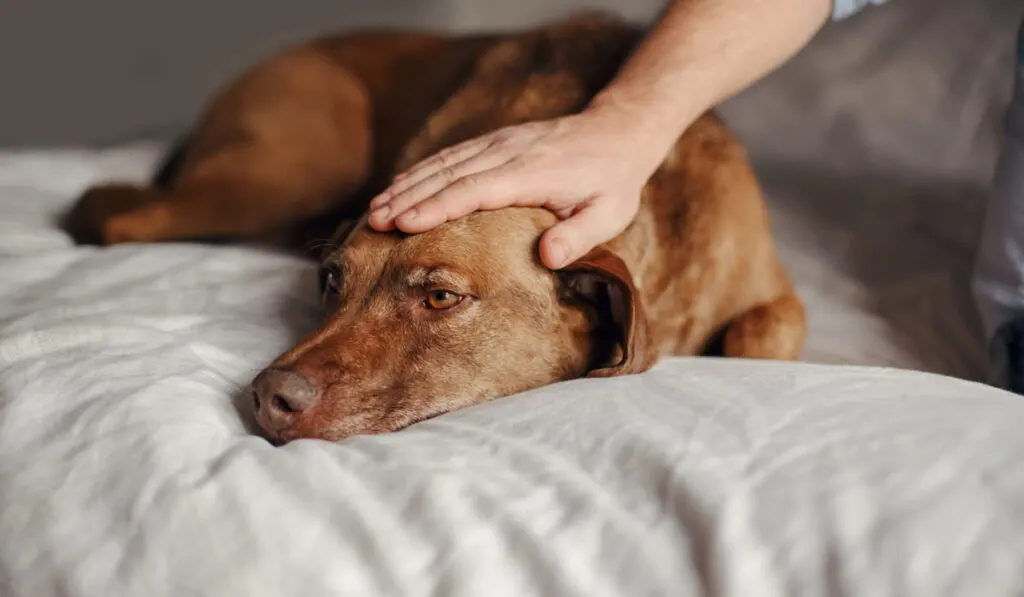
If separation anxiety is the possible trigger for your dog’s anxiety, try to slowly introduce your dog to the idea of being away from you.
This can be done by setting up gates or barriers in which your dog is separated from you but is still able to see you. This will get them used to being more independent and becoming less anxious as a result.
Or if boredom is the issue, the cure is a simple and fun one–play with them! Walking, playing, and spending time with your dog are all ways of distracting him from licking his paws.
Keep them mentally stimulated and engaged. This will not only help their paw licking habits, but it will keep them healthy for years to come.
Why Your Dog is Licking His Paws
The reasons vary in seriousness and in how you will want to help them. Monitor their licking, inspect their paws frequently, and listen to what they are trying to tell you. Always seek help from a professional if they appear to be in pain or are causing themselves stress and anxiety.
And remember, there are plenty of very normal and healthy reasons they are licking their paws as well. Allow them their grooming time and only intervene if it becomes hazardous to them.
